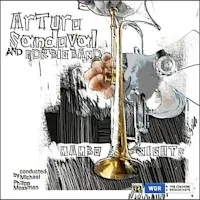Styles: Big Band
Year: 2023
File: MP3@320K/s
Time: 45:23
Size: 104,8 MB
Art: Front
(3:54) 1. Aria
(2:52) 2. Variation 1
(2:40) 3. Variation 2
(2:48) 4. Variation 3
(2:54) 5. Variation 4
(2:30) 6. Variation 5
(3:18) 7. Variation 6
(2:59) 8. Variation 7
(2:07) 9. Variation 8
(2:51) 10. Variation 9
(2:15) 11. Variation 10
(2:29) 12. Variation 11
(2:50) 13. Variation 12
(3:31) 14. Variation 13
(2:43) 15. Variation 14
(2:35) 16. Variation 15
Album: Ariabesques - WDR Big Band Plays Bach Disc 2
Time: 48:53
Size: 112,9 MB
(3:12) 1. Variation 16
(2:49) 2. Variation 17
(2:57) 3. Variation 18
(3:07) 4. Variation 19
(2:47) 5. Variation 20
(2:55) 6. Variation 21
(2:21) 7. Variation 22
(2:54) 8. Variation 23
(3:12) 9. Variation 24
(3:53) 10. Variation 25
(3:05) 11. Variation 26
(3:01) 12. Variation 27
(3:21) 13. Variation 28
(3:15) 14. Variation 29
(2:14) 15. Variation 30
(3:44) 16. Aria (Finale)
With Ariabesques Bill Dobbins and the WDR Big Band have brought Johann Sebastian Bach's Goldberg Variations to new life - double CD in a three-part digipack with a 12-page booklet on Jazzline. The American composer, pianist, jazz teacher and conductor Bill Dobbins has worked with many popular musicians of various genres and has taught at the Eastman School of Music on several occasions.
In the 1990s, Dobbins first came into contact with the renowned WDR Big Band in Cologne and was chief conductor from 1994 to 2002. For years, their cast has included international stars such as Karolina Strassmayer and Ludwig Nuss. In 2007, the WDR Big Band received its first Grammy and has many other recognized successes. The Goldberg Variations are not the first Bach compositions that Dobbins and the people of Cologne have dared to write.
A jazz version of Bach's Christmas Oratorio with the well-known ensemble The King's Singers was released in 2010. Originally composed for the two-manual harpsichord, Dobbins transformed the Goldberg Variations into an impressive version for big band by swapping repeated notes with short rests.
Through the fusion of the original melodies and the most important notes of the bass lines with impressive solos, Bach's characteristics form a stringent basis, which creates original sound impressions with funky jazz elements and makes the work a completely new experience.
https://www.amazon.ca/Ariabesques-Band-Plays-Goldberg-Variations/dp/B0C162DB7S
In the 1990s, Dobbins first came into contact with the renowned WDR Big Band in Cologne and was chief conductor from 1994 to 2002. For years, their cast has included international stars such as Karolina Strassmayer and Ludwig Nuss. In 2007, the WDR Big Band received its first Grammy and has many other recognized successes. The Goldberg Variations are not the first Bach compositions that Dobbins and the people of Cologne have dared to write.
A jazz version of Bach's Christmas Oratorio with the well-known ensemble The King's Singers was released in 2010. Originally composed for the two-manual harpsichord, Dobbins transformed the Goldberg Variations into an impressive version for big band by swapping repeated notes with short rests.
Through the fusion of the original melodies and the most important notes of the bass lines with impressive solos, Bach's characteristics form a stringent basis, which creates original sound impressions with funky jazz elements and makes the work a completely new experience.
https://www.amazon.ca/Ariabesques-Band-Plays-Goldberg-Variations/dp/B0C162DB7S
Ariabesques - WDR Big Band Plays Bach Disc, Disc 2






